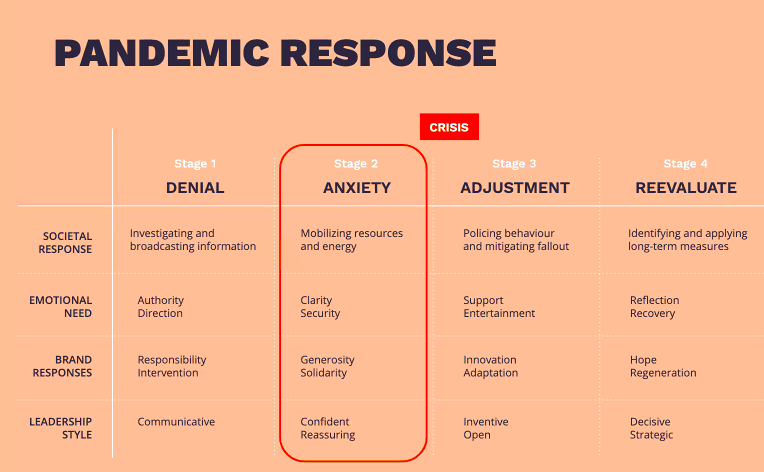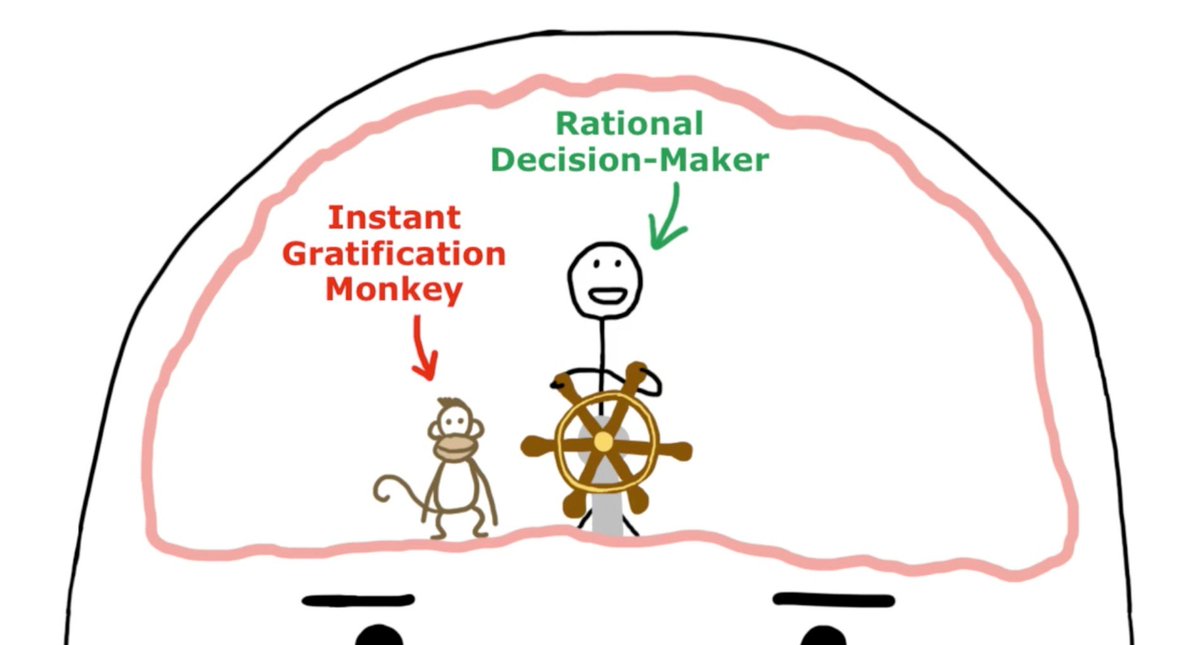Attended a super interesting webinar today all about "pandemic culture" - looking at the impact of social isolation, the role of 24/7 media coverage, what brands can do and what they shouldn& #39;t do etc.
Thought I& #39;d share some take aways in a little thread https://abs.twimg.com/emoji/v2/... draggable="false" alt="💁♀️" title="Woman tipping hand" aria-label="Emoji: Woman tipping hand">
https://abs.twimg.com/emoji/v2/... draggable="false" alt="💁♀️" title="Woman tipping hand" aria-label="Emoji: Woman tipping hand">
Thought I& #39;d share some take aways in a little thread
1) We are in the Anxiety Stage right now.
According to modelling on previous pandemics (ie. SARS, bird / swine flu etc), as cases spike across the US and Europe, we& #39;ve entered the Anxiety Stage of a pandemic.
This is an important phase as new stress moves us out of denial.
According to modelling on previous pandemics (ie. SARS, bird / swine flu etc), as cases spike across the US and Europe, we& #39;ve entered the Anxiety Stage of a pandemic.
This is an important phase as new stress moves us out of denial.
Please note that in the first instance, we& #39;re not talking anxiety disorders here - we& #39;re talking about our natural response to stress.
ie. our in-built, delicate but designed-to-be-useful early warning system.
ie. our in-built, delicate but designed-to-be-useful early warning system.
Our responses in the Anxiety Stage are very much "fight or flight" as we& #39;re responding to the crisis.
It also pushes us into action - making us want to find solutions, take control of the situation. There& #39;s a desire for clarity and security, an urge to work together.
It also pushes us into action - making us want to find solutions, take control of the situation. There& #39;s a desire for clarity and security, an urge to work together.
But here is the thing:
Anxiety is not fear.
Fear has an object. It relates to a known threat.
Anxiety is about the unknowns, the uncertainties, the lack of clarity or security.
Anxiety is not fear.
Fear has an object. It relates to a known threat.
Anxiety is about the unknowns, the uncertainties, the lack of clarity or security.
It& #39;s going down the steps in the dark and realising there& #39;s one more step than you expected - the swooping-stomach of surprise as your foot finds air, and you& #39;re falling and trying to readjust all at once.
Right now "uncertainty" is right up there with words like "unprecedented" and "amid".
We& #39;re using it all the time because we don& #39;t have any proper comparisons.
Not individually as we all isolate.
Not nationally or globally as the world grinds slower and slower every day.
We& #39;re using it all the time because we don& #39;t have any proper comparisons.
Not individually as we all isolate.
Not nationally or globally as the world grinds slower and slower every day.
Not even our leaders really know what they& #39;re doing and scientists seem to be coming up with new, conflicting models all the time.
So of course we& #39;re anxious - we& #39;re being confronted by uncertainty on a colossal scale.
So of course we& #39;re anxious - we& #39;re being confronted by uncertainty on a colossal scale.
And this ends up triggering a sense of lack of control within many of us. We are being overwhelmed. We are frequently confused by all the unknowns.
Add to this our "Availability Bias" and no wonder our anxiety is being aggravated.
Add to this our "Availability Bias" and no wonder our anxiety is being aggravated.
We are bombarded by the media by new information about Covid-19 and its impact every minute of every day.
Death tolls. Case rises. Economic impacts. Loss of jobs. Businesses going under.
Death tolls. Case rises. Economic impacts. Loss of jobs. Businesses going under.
Thing is Covid19 is a newsworthy virus - political agendas, scientific advancement AND media interest are all aligning.
But the inundation of info fuels our anxiety (which ironically then in turn causes us to seek out more information and perpetuate our own stress cycles).
But the inundation of info fuels our anxiety (which ironically then in turn causes us to seek out more information and perpetuate our own stress cycles).
The WHO have even talked of an "infodemic" due to the all consuming nature of the media exposure of the virus.
Also remember when people were talking about "contagion" theory with Grexit (I know what a throwback)?
Well social contagion of situational anxiety is very real -
Also remember when people were talking about "contagion" theory with Grexit (I know what a throwback)?
Well social contagion of situational anxiety is very real -
- particularly whilst we& #39;re isolated and lonely.
Loneliness has a lot of secondary symptoms and impacts on mental health. It intensifies our worries and can create a sense of being powerless.
Loneliness has a lot of secondary symptoms and impacts on mental health. It intensifies our worries and can create a sense of being powerless.
So where does all this leave us?
I mean - it& #39;s not really news that people are anxious right now.
I mean - it& #39;s not really news that people are anxious right now.
Well it& #39;s interesting to think about the role of brands here.
And that brings us to:
2) In that table on pandemic responses, we can see that brands in the anxiety stage are looking to appear generous and demonstrate solidarity with their customers.
And that brings us to:
2) In that table on pandemic responses, we can see that brands in the anxiety stage are looking to appear generous and demonstrate solidarity with their customers.
Some ways of doing this are by looking at what customers need emotionally and how they& #39;re responding societally.
Think about anxiety: it& #39;s triggered by unknowns, uncertainty. So how can a brand help to give back something known, something people can be sure and in control of?
Think about anxiety: it& #39;s triggered by unknowns, uncertainty. So how can a brand help to give back something known, something people can be sure and in control of?
A) Offer Structure
Help people recreate everyday normals, routines and rituals. These are essential coping mechanisms as they provide certainty and control.
When everything is up in the air, we should be helping people to develop new routines and encouraging normality.
Help people recreate everyday normals, routines and rituals. These are essential coping mechanisms as they provide certainty and control.
When everything is up in the air, we should be helping people to develop new routines and encouraging normality.
B) Elevate Routine
People are appreciating the normal things, the regular and the mundane - things like reading and eating good food - so give people a sense of purpose and occasion. Something to make the mundane a little more special.
People are appreciating the normal things, the regular and the mundane - things like reading and eating good food - so give people a sense of purpose and occasion. Something to make the mundane a little more special.
C) Provide Security
Consider control mechanisms - help with organisation, over index on empathy, be incredibly responsive.
Make product changes - make your portions bigger so people don& #39;t need to stockpile, tweak your terms to make returns on purchases longer etc.
Consider control mechanisms - help with organisation, over index on empathy, be incredibly responsive.
Make product changes - make your portions bigger so people don& #39;t need to stockpile, tweak your terms to make returns on purchases longer etc.
D) Control and Escape
Managing anxiety is a balance between a desire for control and desire to escape. So consider your brand messaging.
Do you need to be empowering? empathetic?
Can you give people consumption moments that have nothing to do with Covid-19?
Managing anxiety is a balance between a desire for control and desire to escape. So consider your brand messaging.
Do you need to be empowering? empathetic?
Can you give people consumption moments that have nothing to do with Covid-19?
E) Feeling Good
People want to feel good - so stop treating wellbeing as just a physical thing and think expansively. Look at the social, emotional, cognitive and financial.
Almost every brand or business relates to one of these factors if not more - so find your fit. BUT
People want to feel good - so stop treating wellbeing as just a physical thing and think expansively. Look at the social, emotional, cognitive and financial.
Almost every brand or business relates to one of these factors if not more - so find your fit. BUT
BUT don& #39;t shoe horn yourself into the narrative right now.
It& #39;s okay not to have a voice on this crisis, to hunker down and deliver what you can in the current conditions without spinning it.
In fact that might be better for your brand than to try and capitalise on the chaos.
It& #39;s okay not to have a voice on this crisis, to hunker down and deliver what you can in the current conditions without spinning it.
In fact that might be better for your brand than to try and capitalise on the chaos.
F) People are overwhelmed.
So be simple, clear, reassuring and consistent.
So be simple, clear, reassuring and consistent.
3) What about consumerism?
For many businesses and brands, we& #39;re looking at a period of restrained consumption.
The values and habits that traditionally shape spending are changing massively and fast - some are entirely disrupted already - so what might that mean long term?
For many businesses and brands, we& #39;re looking at a period of restrained consumption.
The values and habits that traditionally shape spending are changing massively and fast - some are entirely disrupted already - so what might that mean long term?
Living with less by necessity is very much a thing today - partly because we simply cannot consume like we did before.
We don& #39;t have the access, cashflow is not great right now, supply shocks abound - the coronavirus is absolutely hitting our instant gratification monkeys.
We don& #39;t have the access, cashflow is not great right now, supply shocks abound - the coronavirus is absolutely hitting our instant gratification monkeys.
BUT there& #39;s still the Lipstick / Mascara Effect.
Mini indulgences are going to happen.
People will buy stuff that helps them reinforce their sense of self, identity and esteem. It is a known coping mechanism for anxiety as gives sense of control.
Mini indulgences are going to happen.
People will buy stuff that helps them reinforce their sense of self, identity and esteem. It is a known coping mechanism for anxiety as gives sense of control.
Basically, there are new habits and new contexts to embrace - so for businesses, it& #39;s important to be ready and willing to pivot, you need to be flexible and think about how you can tap into these crisis behaviours in a positive and emotionally sensitive way.
To stay relevant you& #39;ll need to think about new customer journeys - streaming, take aways, socialising around netflix.
Reinvent your access points.
Don’t depend on old ways.
Reinvent your access points.
Don’t depend on old ways.

 Read on Twitter
Read on Twitter





